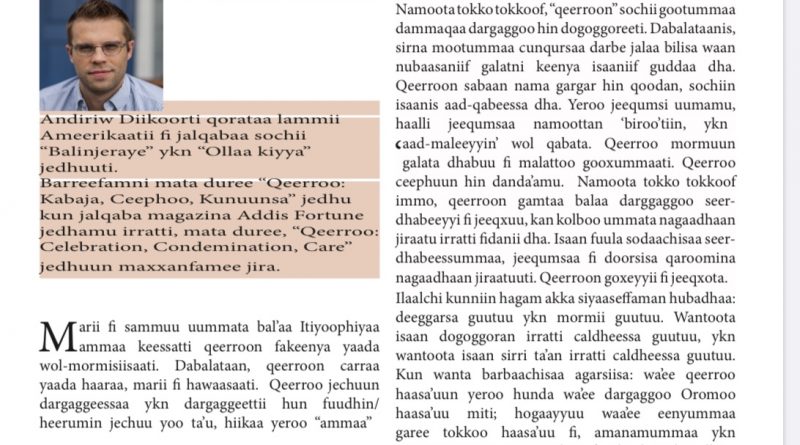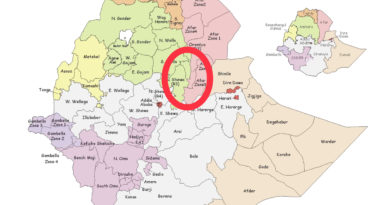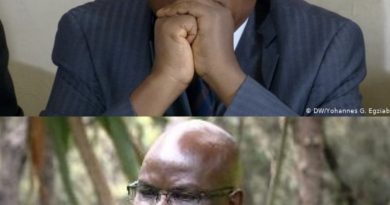Ethiopia, Ethnicity, and Ethics
Andrew DeCort
Awol gives us yet another thought-provoking article worth reading and reflecting upon.
This passage struck me as critical:
“Today, nationalist frameworks provide the normative vocabulary and ethical framework through which most political actors understand the nature of the problems facing their constituencies… [The Prosperity Party] will be vulnerable to attacks by nationalist parties that claim to represent the exclusive and authentic voice of a people and examine everything from the vantage point of that group… Ultimately, in a democratic and competitive election, ethnic groups are highly likely to support the party that speaks in their name.”
Awol’s description of the dominant thinking in Ethiopia today seems accurate. Few would deny it.
But I fear this thinking risks repeating and even intensifying the injustices and resentments of the past.
Isn’t it true that the equation of “nationalist frameworks” with “ethical framework” has caused some of the fundamental moral problems in Ethiopia?
Explicitly or implicitly (sometimes combined with religion), this ethnic-ethical equation is what has justified (1) geo-political domination, (2) economic nepotism, (3) bureaucratic favoritism, (4) systemic exclusion, and (5) other forms of prejudice and oppression.
Whether we talk about the TPLF or go back further, the so-called winners’ act of “examining everything from the vantage point of [their] group” goes to the heart of what the so-called “losers” have so vehemently resented and condemned as unjust.
Prioritizing “our people” (nationalist framework) over moral principle (ethical framework) – or simply *defining* “moral principle” *in terms of* “our people” (ethnic, religious, and/or otherwise) – has caused ethical disaster in Ethiopia, America, and perhaps most societies.
This ethnic-ethical equation has fueled injustice, the death of trust, radical suspicion, virulent resentment, absolutist zero-sum politics, and a near-total collapse of dialogue and cooperation. Violence comes to seem inevitable.
Can the poison also be the medicine?
I’m certainly not saying that political representatives should ignore the particular needs and desires of their communities, which are rooted in history and culture. Of course not.
But when “nationalist frameworks” become synonymous with “ethical framework,” we have found ourselves in a zero-sum game where power is everything. Rather than reforming or even revolutionizing the past, we reinvent it.
And isn’t that largely what we see today?
Ethics needs to mean something more than ethnicity. We need a shared moral vocabulary – truth, dignity, justice, neighbor-love – with which we can talk to one another and hold each other accountable. We also need a semi-shared moral vision to which we can aspire and cooperate.
Otherwise, might will always define right, and winner’s justice and loser’s oppression will remain indistinguishable. One’s elilta (celebration) will be another’s lekso (grief).
I remain persuaded that the national, political, and economic crises of Ethiopia are inseparable from a deeper moral crisis – a crisis of language and values concerning the good life and how to pursue it in a nonviolent, cooperative manner. If my principle is my people and my ethical framework is simply my group’s advantage, many more lives will be lost and injustice will continue to spread like a ruinous cancer – regardless of whomever the “winners” and “losers” may be. In fact, everyone will lose, because the wheel will turn (“tera”) and eventually crush everyone.
There is an urgent need for ethnic and ethical consciousness to be re-integrated, such that language can be reborn, dialogue can resume, and cooperation and accountability can become possible.
I believe the framework of neighbor-love – rooted in Ethiopia’s Jewish, Christian, Islamic, and democratic traditions – can serve this purpose. It grounds (1) human dignity (everyone is a neighbor with precious value), (2) human equality and justice under the law (others should be treated as oneself), and (3) forgiveness and affection after we have harmed one another (love). Neighbor-love is the central command in 97% – if not 100% – of Ethiopia’s religious traditions.
If we could reclaim this tradition of neighbor-love, perhaps we could find a vocabulary and vision that would help us more respectfully and resourcefully dialogue, disagree, and still seek the common good.
Of course, this is never simple or easy. But it could overcome the zero-sum game that threatens society with increasing intolerance, extremism, and violence.




